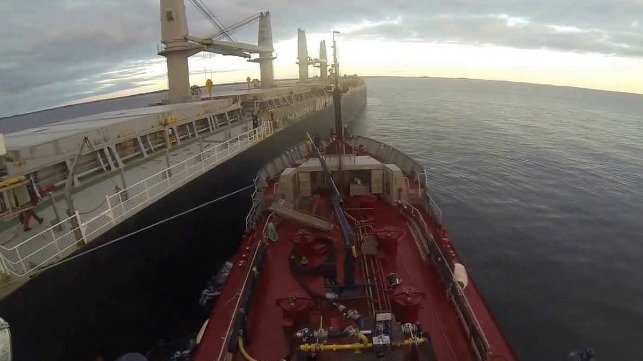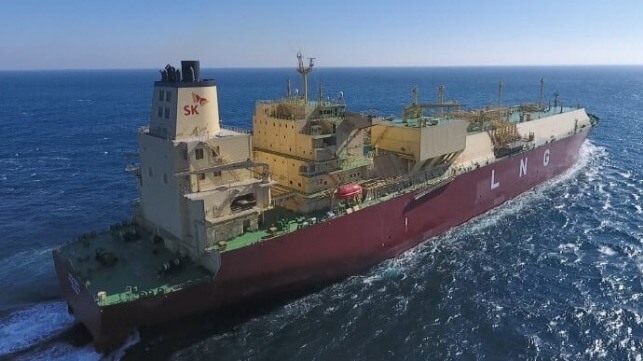Cargill and Hafnia Look to Shake Up Bunker Business with New JV

A newly formed joint venture between Hafnia and Cargill’s Ocean Transportation business looks to emerge as one of the largest bunker suppliers while also driving the move to decarbonization. The two companies announced today the plans to launch Seascale Energy. By combining strengths, the two companies said they aim to set a new standard for marine fuel procurement by delivering considerable cost efficiencies, transparency, and access to sustainable fuel innovations.
Expected to launch in mid-2025, Seascale Energy will initially represent 7.5 million metric tons in bunkering volume placing it solidly among the ten largest bunker providers. It will be jointly owned and managed under a dual-CEO structure with officers ranging from Singapore to Geneva, Copenhagen, and Houston.
“Our vision is to lead the energy transition in shipping, unlocking value for our stakeholders while addressing industry challenges around transparency, quality, and decarbonization,” said Jan Dieleman, President of Cargill’s Ocean Transportation business. “Together, we are shaping a more sustainable future for marine fuel procurement.”
Cargill best known as an agricultural company and trader also operates a large shipping division. In 2021, the company launched Pure Marine Fuels as a partnership with Maersk Tankers. The two companies said they purchased over 4 million tons of bunkers annually. In a 2023 interview with S&P, Cargill highlighted its growing position in biofuels. For its shipping operations, Cargill working with Lauritzen ordered what are likely to become the first methanol-fueled bulkers due to introduction this year and next.
Hafnia leads the Bunker Alliance which has over 20 participants from the shipping industry. It reports that the alliance, with a yearly volume of over 3.5 million metric tons, purchases fuel for over 1000 vessels. It ranks among the top 10 bunkering companies in the world.
By consolidating bunker purchasing volumes, Seascale Energy reports it will secure even more competitive pricing and terms while providing tailored procurement solutions to meet its customers’ diverse needs. It will also offer an expanded global port network, giving customers a consistent, high-quality fuel supply worldwide.
“As one of the largest services of its kind, led by two large-scale fuel users, we are committed to improving efficiency and addressing industry challenges to benefit our stakeholders across the maritime sector,” said Hafnia CEO Mikael Skov.
The joint venture reports it will offer shipowners and charterers improved transparency and scale, enabling them to secure competitive deals and benchmark performance. Tailored procurement services will reduce internal costs, freeing resources for customers to focus on their core operations.
Report: HMM to Diversify Position in Korean Shipping Acquiring SK Shipping

HMM, which itself was the subject of takeover talks a year ago, is poised to consolidate the South Korean shipping industry. According to a report in Business Korea and other media outlets, HMM has been selected as the preferred bidder to acquire control of SK Shipping, Korea’s leader in energy shipping. The deal aligns with HMM’s declared strategy to expand beyond its primary operations in container shipping.
SK Shipping was started in 1982 and remained a part of the SK Conglomerate until being acquired in 2018 by investment group Hahn & Co. Since then, the company has been reshaped shedding old ships and building its position in crude oil, LNG, LPG, bulk shipping, and bunkering.
Hahn has been exploring selling the crude oil tankers and then in October 2024 was reported to have retained Morgan Stanley to shop the company. Hahn paid approximately $1 billion for a stake that today is nearly 80 percent of SK Shipping with the media reports saying Hahn is seeking $2.8 billion for control of the company. The former parent, SK Group, retains approximately 16 percent ownership.
HMM is reported to be starting due diligence after being selected as the preferred bidder. The media reports suggest a deal would be completed by as early as April.
In addition to discussions on the valuation, one challenge the media reports highlight is a non-compete agreement that still covers the LNG business for HMM. During the restructuring of the former Hyundai Merchant Marine, the company in 2014 sold its LNG carrier business to an investment firm and entered into a non-compete agreement in place till 2029. HMM recently explored reacquiring its LNG business but the investment firm in late 2024 delayed the sale of the unit for two more years.
Speculation is that HMM might proceed without the dozen LNG carriers owned by SK Shipping. HMM is expected to make an offer of $1.4 billion for the 22 crude oil tankers, 14 LPG carriers, 10 bulk carriers, and seven bunker ships. It would expand and diversify HMM’s tanker and non-container operations.
The sale of HMM by the state-controlled banks was canceled in 2024 when the banks failed to come to terms with Harim Group and private equity fund JKL Partners which had been selected as the preferred bidder. HMM has emphasized a growth strategy continuing after it reported its third-highest-ever sales in 2024 topping performance during the peak of the pandemic-related surge in shipping.
HMM is currently ranked eighth in container shipping with a total capacity of just over 900,000 TEU. To increase profitability the company said it will be introducing 12 new 13,000 TEU containerships deploying them on routes to the Americas and opening a new route to Mexico. The company has an orderbook for nine additional containerships with 9,000 EU capacity and methanol or LNG fueled. HMM is also poised to enter ownership in the car carrier sector ordering ships that will operate under long-term charters to Hyundai-Glovis.
No comments:
Post a Comment